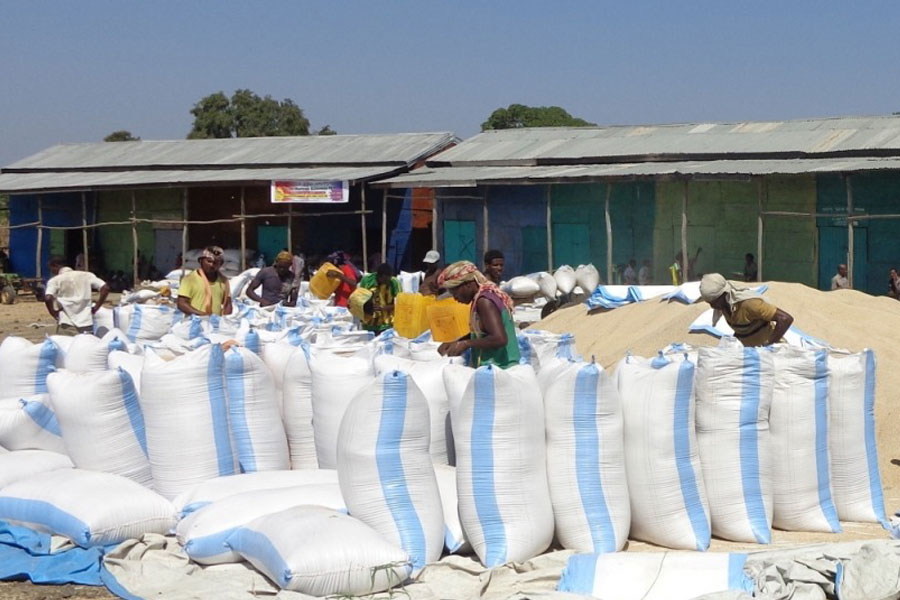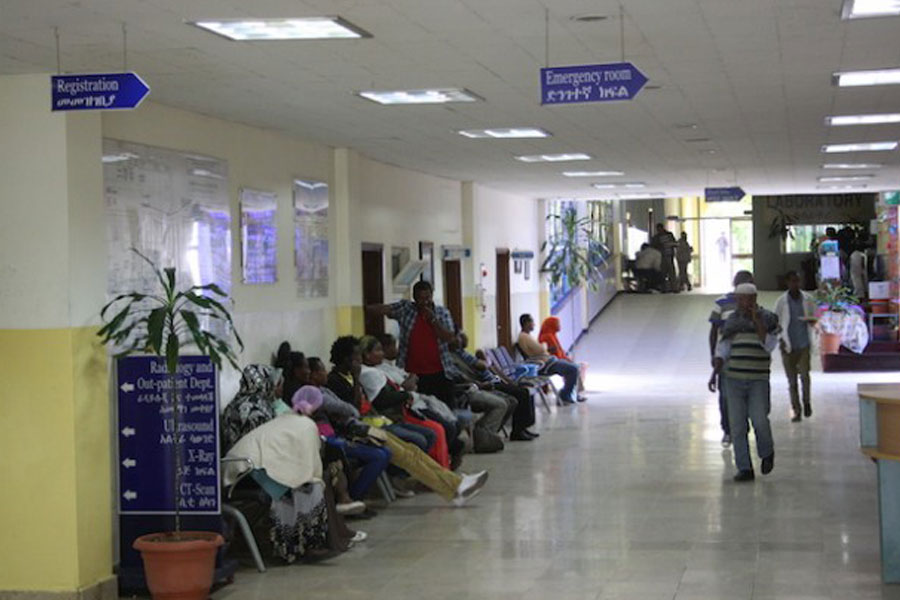
Commentaries | Apr 02,2022
Nov 30 , 2019
By Henok Semaegzer Fente
The eWTP platform that is being promoted by Jack Ma has tremendous potential to transform markets, but to what end or to whose benefit remains a threat worthy of consideration, writes Henok Semaegzer Fente, a media educator and policy advisor. He is the executive director of MERSA Media Institute, a non-profit think tank. He can be reached at fente@mersamedia.org.
Remember the Ali Baba tale in Arabian Nights, where a poor woodcutter discovers a secret phrase to a world of treasures – “Open Sesame"? Chinese tech billionaire Jack Ma is making the same call to open global markets to the world’s poor. But why would the treasure keeper want to share his gains with emerging economies like Ethiopia?
Ma has a stirring vision under his new cross-border trade initiative - the Electronic World Trade Platform (eWTP) that Ethiopia joined this week. He hopes to transform the current global market system, dominated by a few giant companies, by creating an alternative world trade platform composed mainly of small and medium businesses in emerging markets that buy and sell online across borders.
Why would a global internet giant that has more than half a billion users on its platform with a market capital of half a trillion dollars change the existing order?
Here is the catch: the “inclusive” cross-border trade is expected to take place under the Alibaba Group - the internet infrastructure and e-commerce company Ma founded in 1999.
This week, Ethiopia signed a memorandum of understanding with Alibaba Group, becoming the second African country after Rwanda to join the trade network. This is a relatively new venture for the two east African nations, Rwanda having joined last year.
Prime Minister Abiy Ahmed’s (PhD) administration is excited about this new deal with the Alibaba Group for the right reasons. Abiy’s administration needs to deliver jobs to a predominantly youthful population that is organised and very demanding. The Prime Minister also faces a foreign currency crisis with dwindling exports and lack of foreign capital investments in the country. For the immediate future, joining the eWTP is a no-brainer. The promise of a digital economy that brings jobs to SMEs–mainly the youth–and helps boost exports is all too convincing.
The benefits of creating this public-private sector cooperation and its potential to unleash economic growth in the country are tremendous from the point of view of improving market systems, regulations and, most importantly, creating jobs.
For people like myself whose bread is made questioning the best intentions of people for potential pitfalls in the future, especially in public service, I suggest we start this partnership with Alibaba by asking the right questions and taking the right actions. We all know too well where campaign-style economic development agreements on the sale of land to commercial agribusiness entities without proper due diligence left us - families displaced, promises not delivered, resources wasted and people out in the streets with anti-state and anti-development sentiments. So what are the challenges, opportunities and risks of implementing Ethiopia’s new bold agenda to build a digital economy with the help mainly coming from China’s internet giant Alibaba?
Rules regulating all aspects of internet commerce will be tested and challenges will be identified, which creates an opportunity for reform. For example, banks will be forced to speed up electronic payment systems, which will create a drive to update the financial services sector and the development of efficient and secure online payment platforms.
Ethiopia’s urgent push to build a digital economy through eWTP will have some impact on the development of formal and digital market spaces that will unleash some potential for value added product development in the country.
The eWTP platform has some potential to boost Ethiopian exports such as coffee, arts and crafts and other value-added products. However, the bulk of Ethiopia’s exports are unprocessed agricultural products, which will create a challenge for small and medium businesses to be able to fill up containers.
But there are some challenges. Let’s picture Ethiopia overcoming the technological challenges of internet service provision, online payment platform development, and legal and regulatory challenges to e-commerce. Let’s also assume that young entrepreneurs find the financial services required to engage in a value-added product development process and succeed in producing quality and competitive products for the global market. How will a young entrepreneur from the town of Mersa, who has developed a traditional garment line for export, be able to send products to China?
Let me give you an anecdote of how the postal delivery service works in Mersa town, a bustling centre of agri-business. A good Samaritan called Abdu Siraj, whose tea shop is located between the town’s church and mosque collects all the postal deliveries for the town’s citizens from the early bus coming from Addis. Then he posts the list of people who have mail on a notice board in front of his cafe. The news of the mail finds the receiver through church or mosque goers; so through word of mouth, or these days over the phone, people hear that they have mail delivery. The young entrepreneur who wants to send products for export to China from this town will have to use the same archaic postal delivery system that does not provide insurance, a tracking system or a delivery time frame. This calls for new bold steps to liberalise the postal delivery system and invest in its efficiency.
Ethiopia joining the eWTP platform is a step in the right direction with one leg shackled firmly to structural challenges that have hampered growth in the past. Market efficiency, logistics, access to finance, attracting foreign and local capital for export businesses, government policy and regulation are all too prevalent in the digital marketplace, as they are in the traditional market of goods and services.
There is also the threat of an alternative market system controlled by one giant. Every year, the world’s movers and shakers in business and politics gather in the Alps resort town of Davos, Switzerland, to discuss the state of the world’s economy. At the World Economic Forum last year, the editor of The Economist, Zanny Minton Beddoes, moderated a discussion that featured Rwandan President Paul Kagame and founder of Alibaba Group Jack Ma. The two guests explained why eWTP is an important platform for economic inclusion of emerging markets into the global economy. The moderator asked the Rwandan leader, “Mr. President, would you worry about having a trading system focused on one company?”
This worried neither President Kagame nor Jack Ma. The Rwandan president said, as long as the platform is inclusive and creates jobs for youth in his country, one company owning the platform is the least of his worries. Jack Ma referred to a culture of worry in the West and what he called the obsession to regulate. “That is why we don’t go to America first, we don’t come to the European countries first, we go to the countries that believe in [it] first,” Ma said.
We do not know the details of the deal under the eWTP platform and how it will help transform the economies of Rwanda and Ethiopia. We also do not know if this is an export-driven platform for African countries to Chinese markets or vice versa. What we know for sure is it has tremendous potential to transform existing marketplaces in Africa and bring economic efficiency, but to what end or to whose benefit remains a threat worthy of consideration. For now, Alibaba and Jack Ma are saying to Africa, “Open Sesame.”
PUBLISHED ON
Nov 30,2019 [ VOL
20 , NO
1022]


Commentaries | Apr 02,2022

Commentaries | Aug 25,2024

Radar | May 18,2019

Covid-19 | Apr 08,2020

Exclusive Interviews | Jan 05,2020

Radar | May 23,2020

Agenda | May 13,2023

View From Arada | Feb 09,2019

View From Arada | Mar 27,2021

Radar | Sep 04,2021

My Opinion | 132272 Views | Aug 14,2021

My Opinion | 128692 Views | Aug 21,2021

My Opinion | 126600 Views | Sep 10,2021

My Opinion | 124206 Views | Aug 07,2021





Dec 22 , 2024 . By TIZITA SHEWAFERAW
Charged with transforming colossal state-owned enterprises into modern and competitiv...

Aug 18 , 2024 . By AKSAH ITALO
Although predictable Yonas Zerihun's job in the ride-hailing service is not immune to...

Jul 28 , 2024 . By TIZITA SHEWAFERAW
Unhabitual, perhaps too many, Samuel Gebreyohannes, 38, used to occasionally enjoy a couple of beers at breakfast. However, he recently swit...

Jul 13 , 2024 . By AKSAH ITALO
Investors who rely on tractors, trucks, and field vehicles for commuting, transporting commodities, and f...

Jul 12 , 2025
Political leaders and their policy advisors often promise great leaps forward, yet th...

Jul 5 , 2025
Six years ago, Ethiopia was the darling of international liberal commentators. A year...

Jun 28 , 2025
Meseret Damtie, the assertive auditor general, has never been shy about naming names...

Jun 21 , 2025
A well-worn adage says, “Budget is not destiny, but it is direction.” Examining t...

Jul 13 , 2025 . By YITBAREK GETACHEW
The Addis Abeba City Revenue Bureau has introduced a new directive set to reshape how...

Jul 13 , 2025 . By BEZAWIT HULUAGER
Addis Abeba has approved a record 350 billion Br budget for the 2025/26 fiscal year,...

Jul 13 , 2025 . By RUTH BERHANU
The Addis Abeba Revenue Bureau has scrapped a value-added tax (VAT) on unprocessed ve...

Jul 13 , 2025 . By NAHOM AYELE
Federal lawmakers have finally brought closure to a protracted and contentious tax de...